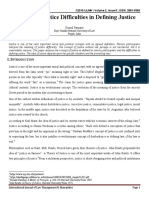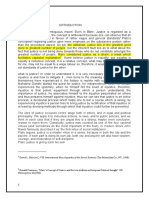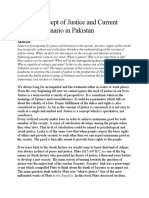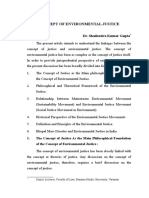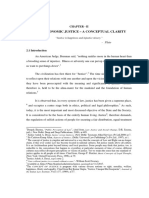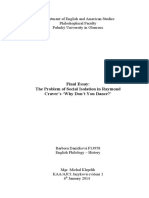HAWASSA UNIVERISITY COLLEGE OF LAW AND
GOVERNANCE AND DEVELOPMENT STUDIES
DEPARTEMENT OF COMMERCIAL LAW
Summary on justice and utilitarianism
NAME: ABDILSEMED BEDEWI
Id;001/14
Submitted to associate professor Negusse, A
Submitted Data January 14/2022
I
�Chapter summery
Man has been continuously struggling for the maintenance of justice. In democratic systems,
justice is given the highest place. The word justice is derived from the latin word jus which
means to bind' to contract. The Greek word for justice is Dike. Its gives the meaning of nearer to
righteousness. Justice means following of norms (customs). Justice stands for just conduct,
fairness or exercise of authority in maintenance or right. Concept of justice is as old as the
political theory itself. Different interpretations are given to justice from time to time. Some
writers regard justice as virtue while others hold it for equality' Some consider it as rule of law'.
Justice is not onlyan integral part of political science, but also of ethics, law, philosophy,
In the history of ideas, there are two majors’ concepts of justice. They are:
1. Numerical concept of justice -Its gives equal share to all. The Greek city states took the
rule so far that many offices were filled by lot. The holding of an office did not call for any
special knowledge or qualification. This concept is expressed by Jeremy Bentham as everyone is
to count for one, nobody for more than one.
2. Geometrical concept of justice – It is a concept of proportionate equality. Its means equal
share to equal and unequal to unequal’s. it means that distribution of power and patronage should
be proportionate to worth or contribution of the individual. Pluto and Aristotle favor this.
The concept of justice has the following implications:
1. It requires a just state of affaires
2. It is aligned with the condition of morality
3. It carries the sense of proper distribution of favor and losses and
4. It normally prevails in a non-democratic set up as exception
In the primitive society, the basis objective f justice was to inflict punishment on the offenders of
a crime. The punishment was very serve. An eye for an eye and a tooth for a tooth was part of
the administration of justice. The objective was to prevent the future crimes. Hence, the nature of
justice in the primitive was purely negative. It is based on conventional morality or tradition or
custom. The political philosophers beginning from Plato (427 BC-347 BC) right up to the
twenty-first century, the theory has been defined in various ways.
Plato, the father of political philosophy, in his THE REPUBLIC defined justice as one of
functional specialization. He was of was opinion of justice was ethical or philosophical and not
based on conventional morality. An individual render of justice if he performed his duties for
which he was fitted and trained for
1
�Plato, further, viewed as a quality of the soul and habit of mind and aimed at an organic society.
Plato regarded justice as the supreme virtue.
Plato's justice is based on three principles of society:
i. Non interference: The state is created for mutual needs in terms of services and not of powers.
No class should interfere with the task of others classes. It shall concentrate on its own sphere of
duty and shall not meddle with the sphere of others.
ii. Functional specialization: Even the ruler is no exception for he has the special function to
which his wisdom entitles him. There is no notion of authority or sovereign power.
iii. Harmony: human virtue according to Plato is divided into wisdom, cporage, temperature and
justice. The first three he assigned on to each class. i.e, philosopher king was to arrange these
matters in the most advantageous way
Aristotle was born at Stagira, a great colonial town on the Macedonian coast in 384 B.C. His
father was Nichomachus, a court physician. Aristotle while discussing justice distinguishes
complete or universal justice from particular justice.
Complete and universal justice: Complete justice is identifiable with moral virtue, i.e, obedience
to law. The moral virtue regulates all public and social relation among men. Complete justice is
such as exists people who are associated in common life with a view to self –sufficiency and
enjoy freedom and equality.
Particular justice: particular justice, on the other hand lies in the observance of rules of
proportionate equality. particular justice exists Iin particular from governments. Such as
oligarchy democracy.
In contemporary times a large number of scholars use prefer to describe the concept of Justice as
Social Justice. Social Justice is taken to mean that all the people in a society are to be equal and
there is be no discrimination on the basis of religion, caste, creed, colour, sex or status.
Economic Justice is indeed closely related to social justice because economic system is always
an integral part of the social system. Economic rights and opportunities available to an individual
are always a part of the entire social system. Economic justice demands that all citizens should
2
�have adequate opportunities to earn their livelihood and get fair wages as can enable they to
satisfy their basic needs and help them to develop further. The state should provide them
economic security during illness, old age and in the event of a disability.
Western Theories of Justice
Justice is one of the most important moral and political concepts. The word comes from the
Latin jus, meaning right or law. The Oxford English Dictionary defines the “just” person as one
who typically “does what is morally right” and is disposed to “giving everyone his or her due,”
offering the word “fair” as a synonym. But philosophers want to get beyond etymology and
dictionary definitions to consider, for example, the nature of justice as both a moral virtue of
character and a desirable quality of political society, as well as how it applies to ethical and
social decision-making. Western philosophical conceptions of justice.
For Plato, justice is a virtue establishing rational order, with each part performing its appropriate
role and not interfering with the proper functioning of other parts.
Aristotle says justice consists in what is lawful and fair, with fairness involving equitable
distributions and the correction of what is inequitable.
For Augustine, the cardinal virtue of justice requires that we try to give all people their due; for
Aquinas, justice is that rational mean between opposite sorts of injustice, involving proportional
distributions and reciprocal transactions.
Hobbes believed justice is an artificial virtue, necessary for civil society, a function of the
voluntary agreements of the social contract;
for Hume, justice essentially serves public utility by protecting property (broadly understood).
For Kant, it is a virtue whereby we respect others’ freedom, autonomy, and dignity by not
interfering with their voluntary actions, so long as those do not violate others’ rights;
Mill said justice is a collective name for the most important social utilities, which are conducive
to fostering and protecting human liberty.
Rawls analyzed justice in terms of maximum equal liberty regarding basic rights and duties for
all members of society, with socio-economic inequalities requiring moral justification in terms of
3
�equal opportunity and beneficial results for all; and various post-Rawlsian philosophers develop
alternative conceptions.
Western philosophers generally regard justice as the most fundamental of all virtues for ordering
interpersonal relations and establishing and maintaining a stable political society. By tracking
the historical interplay of these theories, what will be advocated is a developing understanding of
justice in terms of respecting persons as free, rational agents. One may disagree about the
nature, basis, and legitimate application of justice, but this is its core.
Utilitarianism, his own great essay in ethical theory, Mill gives his own statement of the
principle of utility (again employing a curiously religious word): “The creed which accepts as
the foundation of morals, Utility, or the Greatest Happiness Principle, holds that actions are right
in proportion as they tend to promote happiness, wrong as they tend to produce the reverse of
happiness.” He immediately proceeds to interpret human happiness and unhappiness. in
hedonistic terms of pleasure and pain. This presents the deceptive appearance of a remarkably
simple rubric for practical judgment: if an action generates an excess of pleasure over pain, that
contributes to human happiness, which is our greatest good, making the action right; on the other
hand, if an action generates an excess of pain over pleasure, that contributes to human
unhappiness, which is our greatest evil, making the action wrong. But what is deceptive about
this is the notion that we can sufficiently anticipate future consequences to be able to predict
where our actions will lead us.
Mill acknowledges that concern about a possible conflict between utility and justice has always
been “one of the strongest obstacles” to the acceptance of utilitarianism. If permanently
enslaving a minority could produce overwhelming happiness for a majority (he was personally
opposed to slavery as an unconscionable violation of human liberty), then, given that utility is
the value that trumps all others, why shouldn’t the injustice of slavery be accepted as a
(regrettably) necessary means to a socially desirable end, the former, however unfortunate, being
thus justified? Mill thinks that the key to solving this alleged problem is that of conceptual
analysis, that if we properly understand what “utility” and “justice” are all about, we shall be
able to see that no genuine conflict between them is possible. We have already discerned what
the former concept means and now need to elucidate the latter. Mill lays out five dimensions of
justice as we use the term:
4
�(1) respecting others’ “legal rights” is considered just, while violating them is unjust;
(2) respecting the “moral right” someone has to something is just, while violating it is unjust;
(3) it is considered just to give a person what “he deserves” and unjust to deny it;
(4) it is thought unjust to “break faith” with another, while keeping faith with others is just; and
(5) in some circumstances, it is deemed unjust “to be partial” in one’s judgments and just to be
impartial.
People commonly associate all of these with justice, and they do seem to represent legitimate
aspects of the virtue. (Interestingly, Mill rejects the idea “of equality” as essential to our
understanding of justice, a stand which would be problematic for Marxists.) As he seeks his own
common denominator for these various dimensions of justice, he observes that justice always
goes beyond generic right and wrong to involve what “some individual person can claim from us
as his moral right.” This entails the legitimate sense that anyone who has committed an injustice
deserves to be punished somehow (which connects with Kant). Mill thinks all this boils down to
the idea that justice is a term “for certain moral requirements, which, regarded collectively, stand
higher in the scale of social utility,” being more obligatory “than any others.” But this means
that justice, properly understood, is a name for the most important of “social utilities” Therefore
there purportedly cannot be any genuine conflict between utility and justice. If there ever were
circumstances in which slavery were truly useful to humanity, then presumably it would be just;
the reason it is (typically) unjust is that it violates utility. The main goal here is to reduce justice
to social utility, in such a way as to rule out, by definition, any ultimate conflict between the two.
Thus, the social role played by our sense of justice is allegedly that it serves the common good.
Utilitarianism is a philosophical view or theory about how we should evaluate a wide range of
things that involve choices that people face. Among the things that can be evaluated are actions,
laws, policies, character traits, and moral codes. Utilitarianism is a form of consequentialism
because it rests on the idea that it is the consequences or results of actions, laws, policies, etc.
that determine whether they are good or bad, right or wrong. In general, whatever is being
evaluated, we ought to choose the one that will produce the best overall results. In the language
of utilitarians, we should choose the option that “maximizes utility,” that action or policy that
produces the largest amount of good.
5
�Utilitarianism appears to be a simple theory because it consists of only one evaluative principle:
Do what produces the best consequences. In fact, however, the theory is complex because we
cannot understand that single principle unless we know (at least) three things: a) what things are
good and bad; b) whose good (i.e. which individuals or groups) we should aim to maximize; and
c) whether actions, policies, etc. are made right or wrong by their actual consequences (the
results that our actions actually produce) or by their foreseeable consequences (the results that
we predict will occur based on the evidence that we have).
Act Utilitarianism: Pros and Cons
Act utilitarianism is often seen as the most natural interpretation of the utilitarian ideal. If our
aim is always to produce the best results, it seems plausible to think that in each case of deciding
what is the right thing to do, we should consider the available options (i.e. what actions could be
performed), predict their outcomes, and approve of the action that will produce the most good.
Rule Utilitarianism: Pros and Cons
Unlike act utilitarian’s, who try to maximize overall utility by applying the utilitarian principle to
individual acts, rule utilitarian’s believe that we can maximize utility only by setting up a moral
code that contains rules. The correct moral rules are those whose inclusion in our moral code will
produce better results (more well-being) than other possible rules. Once we determine what these
rules are, we can then judge individual actions by seeing if they conform to these rules. The
principle of utility, then, is used to evaluate rules and is not applied directly to individual actions.
Once the rules are determined, compliance with these rules provides the standard for evaluating
individual actions.








